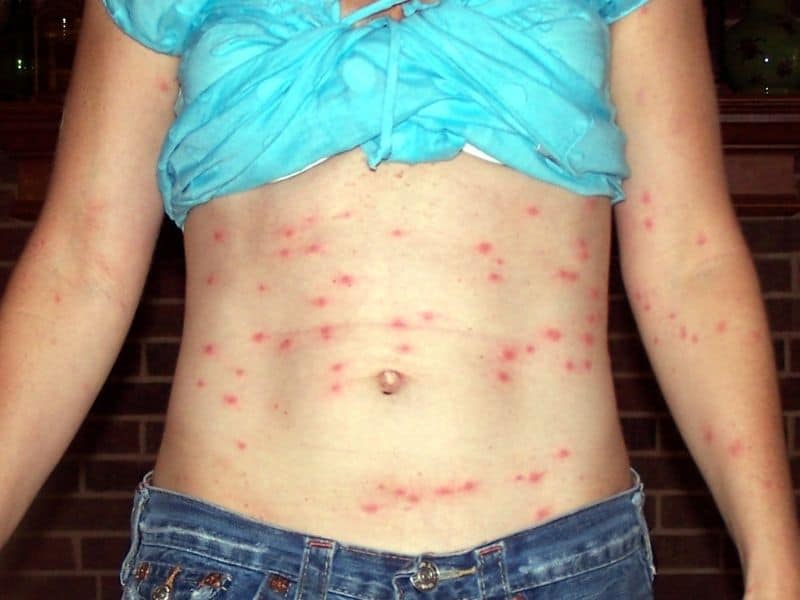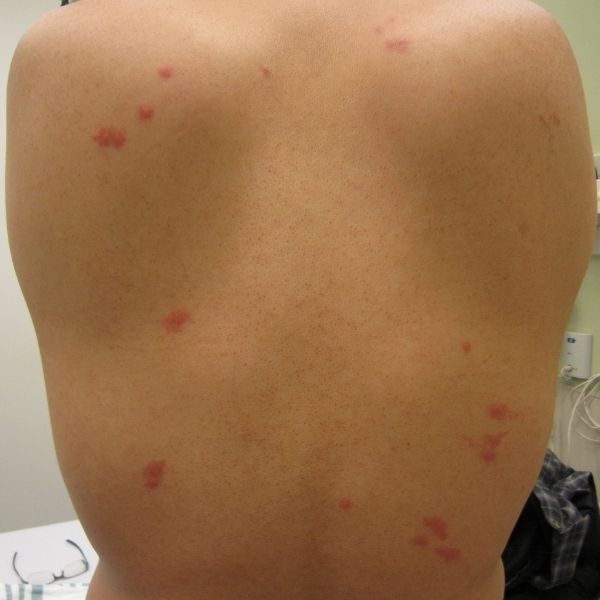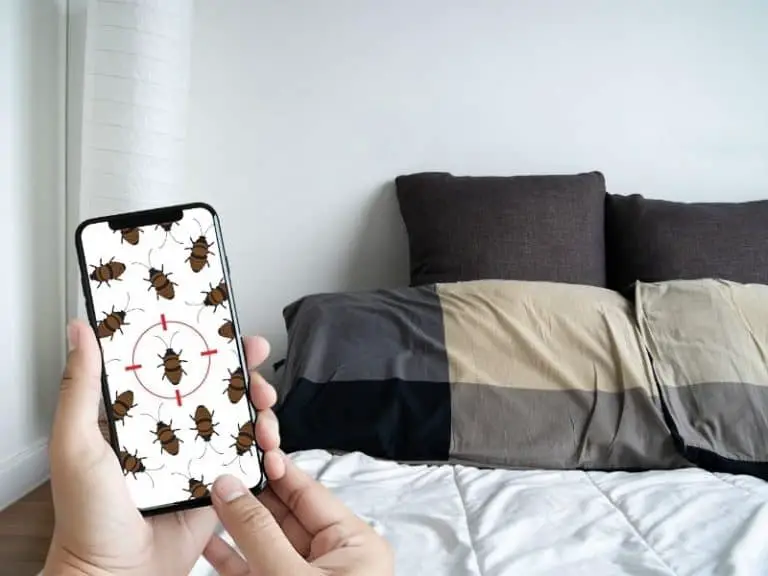How To Tell the Difference Between a Bed Bug and a Chigger Bites?
If you start noticing small raised bite bumps on the skin, you may have been bitten by either bed bugs or chiggers, but how will you be able to know the difference between them?
The difference between bed bug bites and chigger bites is that the former are often found near areas of exposed skin lined together or as random clusters, while the latter are grouped in areas near clothing that are tight-fitting. Both look like small, raised, inflamed, and red spots.
Both bed bugs and chiggers are parasitic insects that feed on people and animals.
Their bites do look similar and are differentiated only by their location and formation. In addition, bed bugs and chiggers are found in very different environments.
Generally, bed bugs and chigger bites are irritating and uncomfortable but are not a risk to your overall health. The bites also have different appearance, symptoms, and reaction times.
Alleviating the symptoms are similar. It is important to know these details in order to effectively eradicate the particular parasitic insects that are pestering you and your home.
Differences Between Chiggers and Bed Bugs
You can determine if you are dealing with chiggers or bed bugs by their differences in behavior and the signs of their presence.
Bed bugs like living near sleeping areas. A good indication of the presence of bed bugs is the presence of red or brown spots on the bedsheets. It is also possible to detect a musty and sweet aroma if there are bed bugs nearby.
Meanwhile, chiggers tend to group into clusters. A chigger that is attached to your body can stay on it and feed on you for as short as several hours and as long as several days. They may only be dislodged if you wash them off or scratch on the area where they are located.
Chiggers can be felt more than they are seen, because they have a microscopic size that is not easily seen by the naked eye.
Both of the bites of chiggers and bed bugs appear as red, inflamed, and raised spots on the skin. The bites of bed bugs are most often seen near exposed skin, appearing in a random cluster or in lines. Meanwhile, chigger bites can be found in groups near tight-fitted clothes.
Symptoms of Bites from Chiggers and Bed Bugs
Below are the characteristics of bites from chiggers and bed bugs.
Symptoms of chigger bites

- Look like small pimples
- Raised and are colored dark red
- The itch gets worse with time
- Found in clustered groups around areas with tight clothing, such as the sock line or the elastic parts of underwear
- As it heals, the center of a chigger bite could have a cap that will ooze when it is scratched
- They elicit a strong reaction in some people
Symptoms of bed bug bites

- Symptoms manifest from a few days to a couple of weeks after being bitten
- Similar to mosquito and flea bites
- Colored red
- Inflamed and are slightly raised
- Itchy
- They have a characteristic zigzag line pattern or could be in clusters
- Often located on exposed skin
- Occur during sleeping time
- Can cause problems in sleeping
- Causes anxiety
- Causes skin irritation
- May be milder or worse depending on the sensitivity of the person’s skin
Reaction Time to Chigger Bites and Bed Bug Bites
Reaction time to chigger bites
Reaction time to chigger bites has a range of duration which depends on the severity and length of exposure.
Short exposure may only cause mild symptoms lasting only for a few days. If chiggers stay on the skin for a longer period of time – for instance, during sleep – then severe symptoms may be experienced that may last for a number of weeks.
Reaction time to bed bug bites
The presence of bed bugs and their bites may not be detected unless there is evidence of their presence on your sleeping area.
People are not likely to feel the bite from a bed bug due to the presence of a substance that bed bugs release. This substance serves to numb the skin and prevent blood from flowing out of the area of the bite.
How Do You Tell If You Have Chiggers?
You can tell if you have chiggers if you have red bumps that appear like small hives, pimples, or blisters, often located around the ankles, waist, and areas with warm skin folds. These become itchier and bigger over many days, and are usually in groups. Bites begin itching after only a few hours.
Chigger bites may not be painful, although they are extremely itchy.
A chigger bite will begin to stop itching after a number of days, with the small bite bumps healing after one to two weeks. If you are bitten by a chigger on your penis, this will cause itching, painful urination, and swelling. It is a condition called summer penile syndrome.
Treatment of Chigger Bites and Bed Bug Bites
Treating the bites of chiggers and bed bugs is focused on alleviating the symptoms in order to eliminate discomfort. The bites themselves will resolve or disappear with time.
The first thing to remember in treating a chigger or bed bug bite involves avoiding scratching it as much as possible.
You should also wash the bite site with soap and warm water. This action will cause remaining chiggers on the skin to be dislodged. You may apply use a cool towel or cloth to the area, or apply cool compress.
You may also use over-the-counter drugs to alleviate bite symptoms. These may include pain relievers such as non-steroidal anti-inflammatory drugs or NSAIDs, as well as acetaminophen. Both classes of drugs may reduce or remove discomfort from the bites.
You may also apply ointments, lotions, and creams on your skin that serve to alleviate itching. Some of these topical drugs may contain steroids such as hydrocortisone.
Oral preparations of anti-histamines are also available that can help control inflammation and itching.
It is important to prevent infection of the bite by keeping them clean, because once the site is invaded by pathogenic bacteria, you may have to require antibiotics, which your doctor can prescribe at their discretion.
It may be necessary to consult your doctor if the symptoms do not disappear or if the bites fail to heal even after several weeks. If you develop fever, chills, and body aches, you may have already developed a bacterial infection.
In addition, the bites may cause an allergic reaction in some people, which may be severe and could lead to life-threatening situations such as difficulty in breathing due to constriction in the airways such as swelling in the throat.
How to Prevent Bites from Chiggers
The known environment in which chiggers naturally occur in the outdoors. They can be found on trails, the woods, in gardens, and in fields that have tall grasses. Any place that has vegetation can have chiggers. However, it is not impossible to find them in other places.
Basic prevention against chiggers involve avoiding walking barefoot on the grass or sitting directly on it. It is also advisable to cover up with your clothing, particularly in areas where chiggers are known to occur. It is essential to wear long sleeves, long pants, and boots or shoes.
It is wise to tuck the pants inside the boots or shoes and to tuck the shirt in your pants. It is also advisable to wear clothing that is treated with permethrin, and apply 25 to 30 percent DEET on your skin.
Chiggers can attach themselves to your clothing; thus, after wearing them, take a shower immediately and scrub your skin thoroughly. Wash your soiled clothes and dry them on high heat in order to kill the chiggers. In addition, wipe down your footwear.
In your residence, you can help prevent chiggers by trimming the vegetation regularly. Insecticides can kill them, but these chemical poisons can also eliminate beneficial pollinators and other insects.
How to Prevent Bites from Bed Bugs
Insecticides may not effectively eliminate bed bugs. In order to keep them out of your home, you should check all luggages, clothing, and furniture going into your home that can be used by bed bugs to enter and colonize your home.
Use a mattress cover that is bedbug-proof and reduce clutter that can be used as hiding places.
It is also advisable to consult a professional pest control expert to ask for effective physical and chemical ways for eliminating bed bugs.
Related questions
What bites by other pests can be mistaken as bites from bed bugs?
Several parasites can cause bites which you can mistake for bed bug bites. These include mosquitoes; body, pubic, and head lice; ticks; fleas; mites; spiders; and allergies from larvae of carpet beetles.
Meanwhile, psocids and springtails are insects that can be mistaken as bed bugs.
Can rubbing alcohol kill bed bugs?
Rubbing alcohol can kill bed bugs and bed bug eggs when it is directly applied to them. However, they are not useful for eradicating bed bug infestations, because bed bugs use hiding places such as crevices and cracks.
Medical Disclaimer: TheHomePestControl is a digital publisher and does not offer personal health or medical advice. The contents of this website are not intended to substitute for professional medical advice, diagnosis, or treatment.
Affiliate Disclaimer: As an Amazon Associate, I earn from qualifying purchases made on our website. If you make a purchase through links from this website, I may earn a commission at no additional cost to you.






